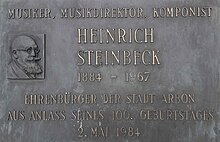Heinrich Steinbeck
Heinrich Steinbeck (born May 2, 1884 in Gödestorf ; † July 20, 1967 in St. Gallen, with his last residence in Arbon , Canton Thurgau , Switzerland ) was a Swiss-German composer and conductor . In recognition of his work, the city of Arbon made him an honorary citizen. A memorial stone on Adolph Saurer -Quai has been commemorating Heinrich Steinbeck since May 2, 1984.
Life
Heinrich Steinbeck's father was a schoolmaster in Gödestorf. Heinrich received his first piano and violin lessons at the age of seven . At the age of eleven he learned to play a wind instrument, which was the first decision he made for his later musical career. His father's acquaintance with a military bandmaster from Hanover, who took the young Steinbeck in and gave him a thorough musical education, was decisive for his future professional life. At the age of 16 he entered the "Military Music School Dömitz - Schwerin ". He then studied at the Bavarian State Conservatory in Würzburg with Max Meyer-Olbersleben (1850–1927), Karl Kliebert (1849–1907), Simon Breu (1858–1933) and Eugen Gugel (1889–1972), where he worked as Kapellmeister and composer and had a pianist training.
He earned his first fees as a pianist in Scandinavia ( Norway , Sweden and Finland ). In 1909 he became Kapellmeister at the Operetta Theater in Karlsruhe . He also directed a well-known wind orchestra. In 1912 he moved to Arbon in Switzerland , where he was elected from over 40 applicants as the new director of the «Stadtmusik Arbon». In addition, he directed the “Orchesterverein Arbon” and the “Arbon workers' choir”, and at times also the music societies of Amriswil , Romanshorn , Steinach , Sulgen , Turbenthal and Uttwil . He was the conductor of the town music of Arbon for almost half a century.
He composed a number of wind orchestra works that have remained in the wind orchestra's repertoire for decades. His regimental salute is one of the most famous military marches in Germany and is often played as a greeting from the armed forces to a state guest. With his march for the Swiss 31st Infantry Regiment, he made the Thurgau song , a regional anthem for the canton on Lake Constance, known in wide circles.
Concert band works
- 1931: Greetings
- 1954: Isola Bella Overture, opus 70
- 1956: Spring in the Heart Overture, opus 73
- Album sheet
- Am Seealpsee Serenade, opus 39
- From the Biedermeier period minuet, opus 23
- The village king opus 34
- The Wanderer in the Mountains Overture, opus 36
- The rock spring overture, opus 41
- The Sun Island Overture, opus 72
- Edelweiss and Alpenrose , opus 28
- Torch dance (Circassian procession) , opus 33
- Free as the eagle march, opus 61
- Spring at Lake Constance Waltz, opus 30
- Greetings from the Säntis concert polka, opus 76, for 2 trumpets and wind orchestra
- The Land of Tyrol March
- Autumn morning fantasy piece in ballad tone
- In old fresh march, opus 21
- Young blood march
- Cornflowers opus 25
- Regimental salute march
- Salve Bernina Overture, opus 80
- Sunday in Alpstein opus 32
- Folk festival in the south ballet scene
- Zingaresca Rhapsody, opus 53
- 131 march
- Infantry Regiment 31 Thurgau March
literature
- Dino Larese : meeting with Swiss composers . Amriswil 1974. pp. 5-10.
- Nekrolog for Heinrich Steibeck. In: Thurgauer Jahrbuch , Vol. 43, 1968 ( e-periodica.ch )
Web links
- Works by and about Heinrich Steinbeck in the catalog of the German National Library
Individual evidence
- ↑ Tagblatt from July 20, 2007: Father of the Thurgau Song ( Memento from October 1, 2017 in the Internet Archive )
| personal data | |
|---|---|
| SURNAME | Steinbeck, Heinrich |
| BRIEF DESCRIPTION | German-Swiss composer and conductor |
| DATE OF BIRTH | May 2, 1884 |
| PLACE OF BIRTH | Godestorf |
| DATE OF DEATH | 20th July 1967 |
| Place of death | St. Gallen , Canton of St. Gallen |
